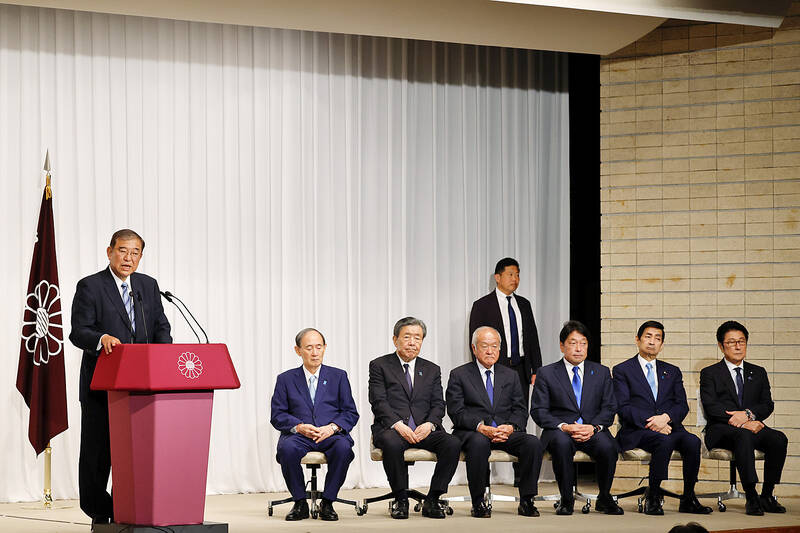The make-up of Japan’s future government was yesterday in flux after voters punished Japanese Prime Minister Shigeru Ishiba’s scandal-tainted coalition in a weekend snap election, leaving no party with a clear mandate to lead the world’s fourth-largest economy.
The uncertainty sent the yen to a three-month low as analysts prepared for days, or possibly weeks, of political wrangling to form a government and potentially a change of leader.
That comes as Japan faces economic headwinds, a tense security situation fueled by an assertive China and nuclear-armed North Korea, and a week before US voters head to the polls in another unpredictable election.

Photo: EPA-EFE
“We cannot allow not even a moment of stagnation, as we face very difficult situations both in our security and economic environments,” Ishiba told a news conference yesterday, pledging to continue as prime minister.
His Liberal Democratic Party (LDP) and its junior coalition partner, Komeito, took 215 seats in the lower house of parliament, down from 279, as voters punished the incumbents over a funding scandal and a cost-of-living crunch.
Two Cabinet ministers and Komeito’s leader, Keiichi Ishii, lost their seats.
The biggest winner of the night, the main opposition Constitutional Democratic Party of Japan (CDPJ), had 148 seats, up from 98 previously, but also still well short of the 233 majority.
A vote on who would take the prime ministership might be held in a special parliamentary session on Nov. 11, multiple ruling coalition sources told Kyodo News yesterday.
There remains uncertainty over whether Ishiba — who became prime minister less than a month ago — can survive after the drubbing. Smaller parties also made gains and their role in negotiations could prove key.
“It seems unlikely that he [Ishiba] will survive to lead a new government as prime minister ... though it is possible he could stay on as caretaker,” said Tobias Harris, founder of Japan Foresight, a political risk advisory firm.
In one bright spot, a record 73 women were elected into Japan’s male-dominated parliament, surpassing 54 at the 2009 election.
Support from smaller parties, such as the Democratic Party for the People (DPP) or the Japan Innovation Party (JIP), which won 28 and 38 seats respectively, could now be key for the LDP.
DPP head Yuichiro Tamaki and JIP leader Nobuyuki Baba have both said they would rule out joining the coalition, but are open to ad hoc cooperation on certain issues.
Ishiba echoed that sentiment, saying “at this moment in time, we are not anticipating a coalition” with other opposition parties.
The LDP would hold discussions with other parties and possibly take on some of their policy ideas, he added.
CDPJ leader Yoshihiko Noda has said he would work with other parties to try and oust the incumbents, although analysts see this as a more remote possibility.
The LDP has World War II history and the result marked its worst election since it briefly lost power in 2009 to a precursor of the CDPJ.
Ishiba, picked in a close-fought race to lead the LDP late last month, called the election a year before it was due in an effort to secure a public mandate.

FALSE DOCUMENTS? Actor William Liao said he was ‘voluntarily cooperating’ with police after a suspect was accused of helping to produce false medical certificates Police yesterday questioned at least six entertainers amid allegations of evasion of compulsory military service, with Lee Chuan (李銓), a member of boy band Choc7 (超克7), and actor Daniel Chen (陳大天) among those summoned. The New Taipei City District Prosecutors’ Office in January launched an investigation into a group that was allegedly helping men dodge compulsory military service using falsified medical documents. Actor Darren Wang (王大陸) has been accused of being one of the group’s clients. As the investigation expanded, investigators at New Taipei City’s Yonghe Precinct said that other entertainers commissioned the group to obtain false documents. The main suspect, a man surnamed

DEMOGRAPHICS: Robotics is the most promising answer to looming labor woes, the long-term care system and national contingency response, an official said Taiwan is to launch a five-year plan to boost the robotics industry in a bid to address labor shortages stemming from a declining and aging population, the Executive Yuan said yesterday. The government approved the initiative, dubbed the Smart Robotics Industry Promotion Plan, via executive order, senior officials told a post-Cabinet meeting news conference in Taipei. Taiwan’s population decline would strain the economy and the nation’s ability to care for vulnerable and elderly people, said Peter Hong (洪樂文), who heads the National Science and Technology Council’s (NSTC) Department of Engineering and Technologies. Projections show that the proportion of Taiwanese 65 or older would

The government is considering polices to increase rental subsidies for people living in social housing who get married and have children, Premier Cho Jung-tai (卓榮泰) said yesterday. During an interview with the Plain Law Movement (法律白話文) podcast, Cho said that housing prices cannot be brought down overnight without affecting banks and mortgages. Therefore, the government is focusing on providing more aid for young people by taking 3 to 5 percent of urban renewal projects and zone expropriations and using that land for social housing, he said. Single people living in social housing who get married and become parents could obtain 50 percent more

Democracies must remain united in the face of a shifting geopolitical landscape, former president Tsai Ing-wen (蔡英文) told the Copenhagen Democracy Summit on Tuesday, while emphasizing the importance of Taiwan’s security to the world. “Taiwan’s security is essential to regional stability and to defending democratic values amid mounting authoritarianism,” Tsai said at the annual forum in the Danish capital. Noting a “new geopolitical landscape” in which global trade and security face “uncertainty and unpredictability,” Tsai said that democracies must remain united and be more committed to building up resilience together in the face of challenges. Resilience “allows us to absorb shocks, adapt under